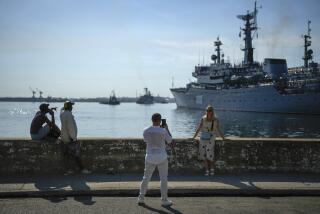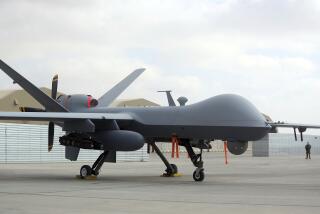Kremlin Issues Protest in Black Sea Encounter
- Share via
MOSCOW — The Soviet Union formally protested Saturday against U.S warships entering territorial waters it claims in the Black Sea and said that Friday’s bumping incident involving warships of the two nations undermined improving superpower relations.
U.S. Ambassador Jack F. Matlock Jr. was summoned to the Soviet Foreign Ministry to hear a protest from Deputy Foreign Minister Alexander A. Bessmertnykh.
The Soviet diplomatic rebuff came after the United States charged that the 9,600-ton Navy cruiser Yorktown and the 7,800-ton destroyer Caron were both deliberately bumped by two Soviet ships off the Crimean coast Friday.
‘Innocent Passage’
Pentagon officials acknowledged the American ships were inside the Soviets’ claimed 12-mile territorial zone but asserted that the American vessels had a right of “innocent passage” through such waters.
The United States recognizes only a 3-mile territorial limit from shore. U. S. officials said the American warships were 7 and 9 miles from the Soviet coast.
Soviet Rear Adm. Nikolai P. Markov, speaking for the Defense Ministry, said that Soviet law does not recognize a right of “innocent passage” in its Black Sea waters.
While the Soviet ships were proceeding on a parallel course in an effort to force the American vessels to sail out of the prohibited zone, he said, “unfortunately a collision occurred.” But this happened only after the American ships ignored signal flag warnings and a radio message, he said.
In its version of the incident, the Pentagon said that, as the U.S. ships entered the claimed Soviet waters, a Soviet naval captain warned they were violating Soviet territory and said he was authorized to “strike” them.
The Americans did not respond to the warning, the Pentagon said, and shortly afterward, two Soviet ships “shouldered” them aside. The two U.S. ships, both larger than the Soviet vessels, suffered minimal damage and no U.S. sailors were hurt, it added.
Gennady I. Gerasimov, chief spokesman for the Foreign Ministry, said that Moscow viewed the incident as a “dangerous and serious” event.
“We must believe it was aimed at undermining the process of bettering Soviet-American relations,” Gerasimov said at a special Saturday press briefing on the incident.
He noted that the same two American warships were involved in a similar incident in March, 1986, adding: “When our relations start to get better, we always see a military provocation.” As an example, he cited the flight of an American U-2 spy plane just before a scheduled Soviet-American summit meeting in 1960. That summit was canceled after the plane was shot down and the pilot, Francis Gary Powers, was captured.
No Hint of Jeopardy
But Gerasimov gave no hint of any retaliation that would jeopardize a scheduled meeting in Moscow between Foreign Minister Eduard A. Shevardnadze and Secretary of State George P. Shultz later this month or a hoped-for late spring summit meeting here between President Reagan and Soviet leader Mikhail S. Gorbachev.
“We hope that this (Black Sea) incident will not hinder the process of bettering Soviet-American relations,” Gerasimov said.
In his description of the encounter, Adm. Markov said there was no substantial damage to any of the four ships involved. This coincides with a Pentagon statement that damage to the U.S. ships was “very, very slight” and that “the extent of damage to the Soviet vessels is unknown but believed to be minor.”
Although the collisions occurred shortly after the American vessels entered Soviet waters, Markov said, they remained inside this country’s claimed boundary area for more than an hour afterward.
Asked specifically if the Soviet ship captains had tried to ram the American warships, Markov replied: “They did not have such intentions.” But he said that Soviet law is clear and that the Soviet coast guard vessels have standing orders to keep out intruders.
“There is no right of innocent passage envisaged,” Markov said.
“Why and for what purpose were American warships so close to Yalta and Sevastopol,” asked Gerasimov, referring to a Black Sea resort and the city that is headquarters for the Soviet southern fleet.
“I don’t think there was this element of innocence in this passage,” he added.
Foreign ships have a right of innocent passage through prescribed shipping lanes, Gerasimov said, but he added that there were no such lanes in the Black Sea.
The Soviet Union is particularly sensitive about its Black Sea waters since ships based there get access to the Mediterranean through the Bosporus and the Dardanelles.
More to Read
Sign up for Essential California
The most important California stories and recommendations in your inbox every morning.
You may occasionally receive promotional content from the Los Angeles Times.













